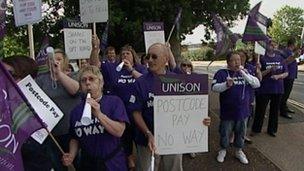Unions angry at health consortium's ideas for South West
- Published

The unions have called the discussions a "short term fix"
Health unions have vowed to fight any changes which could result in staff working longer hours for less money in the South West.
A consortium of 20 hospitals and foundation trusts has published ideas on setting regional pay.
The discussion document said the aim was to seek "greater security for health services and staff".
But unions said it was a "short-term fix designed to address cost pressures" and was a negative move.
No 'engagement'
Details of the regional pay proposals were first made public through a document leaked to the BBC in June, and NHS staff have already staged a series of protests.
Employees have reacted angrily to the plans, saying they could result in cuts to salaries, sick pay, holiday entitlement and extra payments made for working anti-social hours.
A joint statement issued by the health unions, including the BMA, Unite and Unison, said: "Today we give notice that we do not recognise this pay cartel [South West Pay, Terms and Conditions Consortium].
A joint statement issued by the health unions, including the BMA, Unite and Unison, said: "Today we give notice that we do not recognise this pay cartel [South West Pay, Terms and Conditions Consortium].
"NHS staff are paid on national terms and conditions, and any negotiations to alter them should be on a national level.
"This organisation has no status, or authority to enter into negotiations, and the trades unions will therefore not be engaging with any proposals made by the cartel to cut pay, terms and conditions of our members."
The consortium, which was set up in June, employs about 68,000 NHS workers in the whole of the South West.
Its discussion paper has outlined possibilities where money could be saved and the consortium has claimed its measures could safeguard "up to 6,000 NHS jobs".
Saffron Cordery, director of strategy at the Foundation Trust Network, said: "These are cash-strapped times, and trusts need to use their resources in the most effective way to improve the quality of care for patients and invest in its biggest asset - its workforce. A one-size-fits-all agreement is not always the way to achieve this."
The consortium said it wanted to provide an affordable pay, terms and conditions system that recognised and rewarded performance, while promoting greater productivity and creating a flexible workforce that was "fit for purpose in the modern NHS".
Although it said it was exploring options for discussion rather than recommending changes, Unison spokeswoman Tanya Palmer said the plans would be "disastrous".
"The reality of these proposals are about pay cuts, the consequences for the region will be disastrous and will result in skilled health workers being driven out of the region, taking money out of the local economy and deepening the healthcare postcode lottery," she said.
- Published30 July 2012
- Published1 June 2012